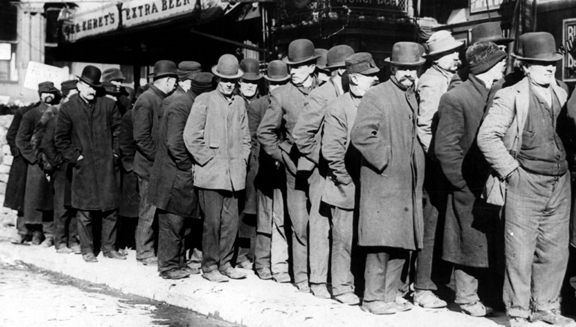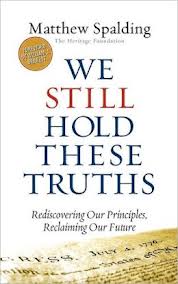By Thomas G. West (Source) (Edited for length by FTU)
Progressivism was the reform movement that ran from the late 19th century through the first decades of the 20th century, during which leading intellectuals and social reformers in the United States sought to address the economic, political, and cultural questions that had arisen in the context of the rapid changes brought with the Industrial Revolution and the growth of modern capitalism in America. The Progressives believed that these changes marked the end of the old order and required the creation of a new order appropriate for the new industrial age.
While the Progressives differed in their assessment of the problems and how to resolve them, they generally shared in common the view that government at every level must be actively involved in these reforms. The existing constitutional system was outdated and must be made into a dynamic, evolving instrument of social change, aided by scientific knowledge and the development of administrative bureaucracy.
The thesis of our book, The Progressive Revolution in Politics and Political Science, is that Progressivism transformed American politics. What was that transformation? It was a total rejection in theory, and a partial rejection in practice, of the principles and policies on which America had been founded and on the basis of which the Civil War had been fought and won only a few years earlier. When I speak of Progressivism, I mean the movement that rose to prominence between about 1880 and 1920.
Today, those who speak of the formative influences that made America what it is today tend to endorse one of three main explanations. Some emphasize material factors such as the closing of the frontier, the Industrial Revolution, the rise of the modern corporation, and accidental emergencies such as wars or the Great Depression, which in turn led to the rise of the modern administrative state.
Second is the rational choice explanation. Morris Fiorina and others argue that once government gets involved in providing extensive services for the public, politicians see that growth in government programs enables them to win elections. The more government does, the easier it is for Congressmen to do favors for voters and donors.
Third, still other scholars believe that the ideas of the American founding itself are responsible for current developments. Robert Bork’s Slouching Toward Gomorrah adopts the view that the Founders’ devotion to the principles of liberty and equality led to the excesses of today’s welfare state and cultural decay. Allan Bloom’s best-selling The Closing of the American Mind presents a more sophisticated version of Bork’s argument.
My own view is this: Although the first two of the three mentioned causes (material circumstances and politicians’ self-interest) certainly played a part, the most important cause was a change in the prevailing understanding of justice among leading American intellectuals and, to a lesser extent, in the American people. Today’s liberalism and the policies that it has generated arose from a conscious repudiation of the principles of the American founding.
During the Progressive Era, a new theory of justice took hold. Its power has been so great that Progressivism, as modified by later developments within contemporary liberalism, has become the predominant view in modern American education, media, popular culture, and politics. Today, people who call themselves conservatives and liberals alike accept much of the Progressive view of the world.
The Progressive Rejection of the Founding
Shortly after the end of the Civil War, a large majority of Americans shared a set of beliefs concerning the purpose of government, its structure, and its most important public policies. Constitutional amendments were passed abolishing slavery and giving the national government the authority to protect the basic civil rights of everyone. Here was a legal foundation on which the promise of the American Revolution could be realized in the South, beyond its already existing implementation in the Northern and Western states.
I will mention several characteristic features of the Founders approach to government and contrast them with the new, Progressive approach.
The Rejection of Nature and the Turn to History
The Founders believed that all men are created equal and that they have certain inalienable rights. All are also obliged to obey the natural law, under which we have not only rights but duties. We are obliged “to respect those rights in others which we value in ourselves” (Jefferson). The main rights were thought to be life and liberty, including the liberty to organize one’s own church, to associate at work or at home with whomever one pleases, and to use one’s talents to acquire and keep property. For the Founders, then, there is a natural moral order — rules discovered by human reason that promote human well-being, rules that can and should guide human life and politics.
The Progressives rejected these claims as naive and unhistorical. In their view, human beings are not born free. John Dewey, the most thoughtful of the Progressives, wrote that freedom is not “something that individuals have as a ready-made possession.” It is “something to be achieved.” In this view, freedom is not a gift of God or nature. It is a product of human making, a gift of the state. Man is a product of his own history.
Since the Progressives held that nature gives man little or nothing and that everything of value to human life is made by man, they concluded that there are no permanent standards of right. Dewey spoke of “historical relativity.” However, in one sense, the Progressives did believe that human beings are oriented toward freedom, not by nature (which, as the merely primitive, contains nothing human), but by the historical process, which has the character of progressing toward increasing freedom. So the “relativity” in question means that in all times, people have views of right and wrong that are tied to their particular times, but in our time, the views of the most enlightened are true because they are in conformity with where history is going.
The Purpose of Government
For the Founders, thinking about government began with the recognition that what man is given by nature — his capacity for reason and the moral law discovered by reason — is, in the most important respect, more valuable than anything government can give him. In the Founders’ view, nature does give human beings the most valuable things: their bodies and minds. These are the basis of their talents, which they achieve by cultivating these natural gifts but which would be impossible without those gifts.
For the Founders, then, the individual’s existence and freedom in this crucial respect are not a gift of government. They are a gift of God and nature. Government is therefore always and fundamentally in the service of the individual, not the other way around. The purpose of government, then, is to enforce the natural law for the members of the political community by securing the people’s natural rights. It does so by preserving their lives and liberties against the violence of others. In the founding, the liberty to be secured by government is not freedom from necessity or poverty. It is freedom from the despotic and predatory domination of some human beings over others.
Government’s main duty for the Founders is to secure that freedom — at home through the making and enforcement of criminal and civil law, abroad through a strong national defense. The protection of life and liberty is achieved through vigorous prosecutions of crime against person and property or through civil suits for recovery of damages, these cases being decided by a jury of one’s peers.
The Progressives regarded the Founders’ scheme as defective because it took too benign a view of nature. As Dewey remarked, they thought that the individual was ready-made by nature. The Founders’ supposed failure to recognize the crucial role of society led the Progressives to disparage the Founders’ insistence on limited government. The Progressive goal of politics is freedom, now understood as freedom from the limits imposed by nature and necessity. For the Progressives, freedom is redefined as the fulfillment of human capacities, which becomes the primary task of the state.
God and Religion
In the founding, God was conceived in one of two ways. Christians and Jews believed in the God of the Bible as the author of liberty but also as the author of the moral law by which human beings are guided toward their duties and, ultimately, toward their happiness. Nonbelievers (Washington called them “mere politicians” in his Farewell Address) thought of God merely as a creative principle or force behind the natural order of things.
Both sides agreed that there is a God of nature who endows men with natural rights and assigns them duties under the law of nature. Believers added that the God of nature is also the God of the Bible, while secular thinkers denied that God was anything more than the God of nature. Everyone saw liberty as a “sacred cause.”
At least some of the Progressives redefined God as human freedom achieved through the right political organization. Or else God was simply rejected as a myth. For Hegel, whose philosophy strongly influenced the Progressives, “the state is the divine idea as it exists on earth.”
Limits on Government and the Integrity of the Private Sphere
For the Founders, the purpose of government is to protect the private sphere. The experience of religious persecution had convinced the Founders that government was incompetent at directing man in his highest endeavors. The requirements of liberty, they thought, meant that self-interested private associations had to be permitted, not because they are good in themselves, but because depriving individuals of freedom of association would deny the liberty that is necessary for the health of society and the flourishing of the individual.
Because of the Progressives’ tendency to view the state as divine and the natural as low, they no longer looked upon the private sphere as that which was to be protected by government. Instead, the realm of the private was seen as the realm of selfishness and oppression. Private property was especially singled out for criticism. Some Progressives openly or covertly spoke of themselves as socialists. In a remark that the Founders would have found repugnant, Progressive political scientist John Burgess wrote that “the most fundamental and indispensable mark of statehood” was “the original, absolute, unlimited, universal power over the individual subject, and all associations of subjects.”
Domestic Policy
For the Founders, domestic policy, concentrated on securing the persons and properties of the people against violence by means of a tough criminal law. The burden of proof was on government if there was to be any limitation on the free use of that property. The Founders tried to promote the moral conditions of an independent, hard-working citizenry by laws and educational institutions that would encourage such virtues as honesty, moderation, justice, patriotism, courage, frugality, and industry.
In Progressivism, the domestic policy of government had two main concerns.
First, government must protect the poor and other victims of capitalism through redistribution of resources, anti-trust laws, government control over the details of commerce and production: i.e., dictating at what prices things must be sold, methods of manufacture, government participation in the banking system, and so on.
Second, government must become involved in the “spiritual” development of its citizens — not, of course, through promotion of religion, but through protecting the environment (“conservation”), education (understood as education to personal creativity), and spiritual uplift through subsidy and promotion of the arts and culture.
Who Should Rule, Experts or Representatives?
The Founders thought that laws should be made by a body of elected officials with roots in local communities. They should not be “experts,” but they should have “most wisdom to discern, and most virtue to pursue, the common good of the society” (Madison).
The Progressives wanted to sweep away what they regarded as this amateurism in politics. They had confidence that modern science had superseded the perspective of the liberally educated statesman. Only those educated in the top universities, preferably in the social sciences, were thought to be capable of governing. Politics was regarded as too complex for common sense to cope with. Government had taken on the vast responsibility not merely of protecting the people against injuries, but of managing the entire economy as well as providing for the people’s spiritual well-being.
The Progressives did not intend to abolish democracy, to be sure. They wanted the people’s will to be more efficiently translated into government policy. But what democracy meant for the Progressives is that the people would take power out of the hands of locally elected officials and political parties and place it instead into the hands of the central government, which would in turn be run by neutral experts.
Progressivism and Today’s Liberalism
This should be enough to show how radically the Progressives broke with the earlier tradition. Of what relevance is all of this today?
Most obviously, the roots of the liberalism with which we are familiar lie in the Progressive Era. This is true not only for the New Deal period of Franklin Roosevelt, but above all for the major institutional and policy changes that were initiated between 1965 and 1975. Whether one regards the transformation of American politics over the past century as good or bad, the foundations of that transformation were laid in the Progressive Era.
Nevertheless, in some respects, the Progressives were closer to the founding than they are to today’s liberalism. So let us conclude by briefly considering the differences between our current liberalism and Progressivism. We may sum up these differences in three words: science, sex, and progress.
First, in regard to science, today’s liberals have a far more ambivalent attitude than the Progressives did. The latter had no doubt that science either had all the answers or was on the road to discovering them. Today, although the prestige of science remains great, it has been greatly diminished by the multicultural perspective that sees science as just another point of view.
Two decades ago, in a widely publicized report of the American Council of Learned Societies, several leading professors in the humanities proclaimed that the “ideal of objectivity and disinterest,” which “has been essential to the development of science,” has been totally rejected by “the consensus of most of the dominant theories” of today. Instead, today’s consensus holds that “all thought does, indeed, develop from particular standpoints, perspectives, interests.” So science is just a Western perspective on reality, no more or less valid than the folk magic believed in by an African or Pacific Island tribe that has never been exposed to modern science.
Second, liberalism today has become preoccupied with sex. Sexual activity is to be freed from all traditional restraints. In the Founders’ view, sex was something that had to be regulated by government because of its tie to the production and raising of children. Practices such as abortion and homosexual conduct — the choice for which was recently equated by the Supreme Court with the right “to define one’s own concept of existence, of meaning, of the universe, and of the mystery of human life” — are considered fundamental rights.
Third, contemporary liberals no longer believe in progress. The Progressives’ faith in progress was rooted in their faith in science, as one can see especially in the European thinkers whom they admired, such as Hegel and Comte. When science is seen as just one perspective among many, then progress itself comes into question.
The idea of progress presupposes that the end result is superior to the point of departure, but contemporary liberals are generally wary of expressing any sense of the superiority of the West, whether intellectually, politically, or in any other way. They are therefore disinclined to support any foreign policy venture that contributes to the strength of America or of the West.
The first great battle for the American soul was settled in the Civil War. The second battle for America’s soul, initiated over a century ago, is still raging. The choice for the Founders’ constitutionalism or the Progressive-liberal administrative state is yet to be fully resolved.













